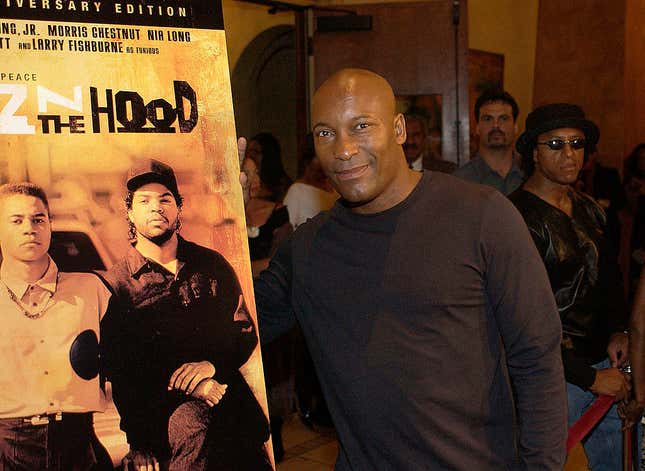
John Singleton passed Monday, April 29, 2019. After suffering a stroke that left him in a coma, his family ultimately decided to take him off life support. To say it was a life gone too soon is an understatement, especially for a figure who has had such a tremendous impact on the black community at large. I grew up in a movie family, so I became an avid watcher from a young age. And as a hip-hop head, I learned a lot, visually, about the worlds I only knew from songs, thanks to John Singleton. To that end, artistically, he is easily one of the most influential artists of my life.
When Boyz n the Hood dropped in 1991, I was 12 years old. Thanks to (and probably unbeknownst to) my older sister, I was already up on NWA and Ice Cube, an early favorite rapper of mine. But listening to those tapes and occasionally seeing music videos (I lived in Frankfurt, Germany, at the time; any videos I saw were on VHS tapes sent from cousins and family members in the States) didn’t expose me to Los Angeles and the South Central Los Angeles I’d heard about in song. Just for the record, I was an extreme L.A. hip-hop head. If it was coming out of L.A., there’s a better than 75 percent chance that I was all over it, even if I didn’t quite realize those were my tastes.
But 12-year-old me didn’t know what L.A. looked like. I didn’t get it. I didn’t truly understand any of the gang culture I’d heard or knew what the streets referenced in songs looked like. I could tell you all about Compton and the police, even though I had absolutely no real-life reference point for what the city looked like. Singleton changed all of that for me. Boyz n the Hood was a look inside South Central. It was a look at the palm trees posing as the backdrop for poverty. It was confusing. How could such a beautiful place be where the rappers said so much bad shit happened?
My first time in Los Angeles was in 2004, and I was mesmerized. I wanted to see if it looked like Poetic Justice. And I wanted to see if the streets looked like they did in Boyz n the Hood, and Baby Boy, one of my absolute faves. Because we watched a lot of movies in my family and because Spike Lee was a looming presence and because so many movies were set in New York City, and Harlem in particular, my vantage point—even if unintentional (I was young)—on most things artistically, especially black, was of New York. The black world of the South I knew because of family, and where I lived largely centered there. Singleton changed all of that. He added a setting to what I thought I knew. I could visualize the world.
I saw black stories I wasn’t familiar with. I saw a world I had heard of but couldn’t place. I saw people living like me but differently. I saw people who, up to that point, were mythical. I knew Southern black life, both city and country. And I vaguely remembered Detroit. But I was in college the first time I ventured up the East Coast and was a graduate of college by the time I saw New York City and Los Angeles in person. But the art I consumed, especially once I was looking for it on purpose, was inspired by those visuals gained as a preteen and teenager.
My favorite thing about art is how it can transport you into places you might not otherwise be able to go. It’s why I’m such an avid reader. My imagination builds landscapes and buildings that house characters. Much of that is inspired by the films I’ve seen. I saw The Color Purple as a child, and Coming to America the same. New Jack City, too. But those weren’t worlds that I fit into or even seemed real. Boyz n the Hood and Poetic Justice were worlds not too far removed from me, just as director Doug McHenry’s Jason’s Lyric would be when it showed me the Houston I knew from The Geto Boys.
Boyz n the Hood has been a looming influence on my life ever since I first saw it. I learned about gentrification. Every time I hear The Five Stairsteps’ “O-o-h Child,” I think of Furious Styles and a young Tre in the car. Even though my grandmother lived 10 minutes driving slowly from the campus of Morehouse College and Spelman College, Boyz was the first time the schools were put on my radar. I didn’t even see the campus until I’d already decided to attend, then taken on a tour by my older sister who was living in Atlanta in my grandmother’s old house that same 10-minutes-but-world’s-away distance. Oddly, Boyz drew me to Los Angeles, convincing me that somehow, I was supposed to be from there. Art is funny that way.
When John Singleton passed away, my first thought was about how much his films, the game-changing ones, affected me. Because they did, and their influence has been present ever since. I’ve never lost the feeling of how Boyz made me feel. I’ve written about it several times for that reason. John Singleton influenced my life with his vision and storytelling and desire to spotlight the world he knew. From Boyz to Poetic Justice to Higher Learning and much later to Baby Boy, John Singleton helped me see black life from new and different perspectives, and I’ve been better for it ever since.
John Singleton, you are appreciated. Rest in Power.

